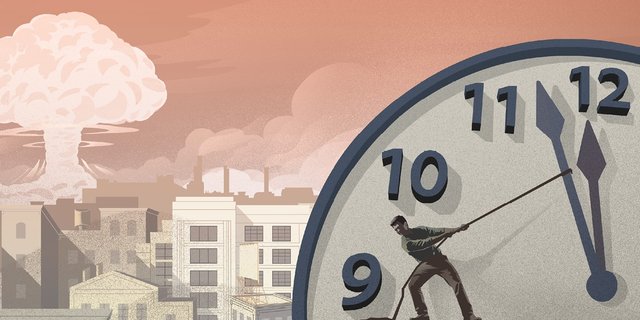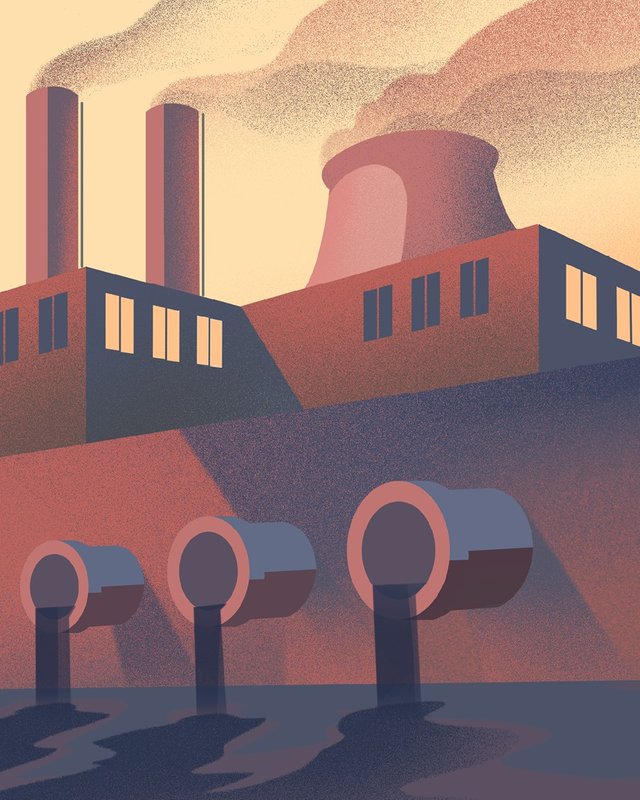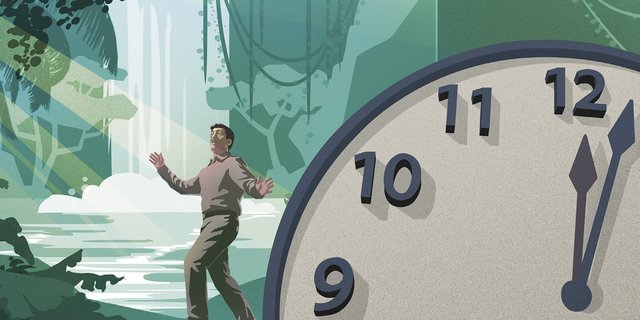Is the World out of Control or Not?

IS THE WORLD OUT OF CONTROL?

THE year 2017 began with a dismal proclamation by the scientific community. In January a group of scientists declared that the world just got closer to the worst catastrophe ever. Using the symbolic Doomsday Clock to illustrate mankind’s proximity to a global disaster, scientists moved the clock’s minute hand forward by 30 seconds. The Doomsday Clock is now set at merely two and a half minutes to midnight—nearer to a global catastrophe than at any time in over 60 years!
In 2018, scientists plan to evaluate again how close we are to the end of the world as we know it. Will the Doomsday Clock still signal an impending and unprecedented catastrophe? What do you think? Is the world out of control? You might find the question somewhat difficult to answer. After all, even experts are divided on this subject. Not everyone believes in an inevitable doomsday.
In fact, millions of people believe in a bright future. They profess to have evidence showing that mankind and our planet will survive indefinitely and that our quality of life will improve. Is that evidence credible? Is the world out of control or not?
“The Doomsday Clock is an internationally recognized design that conveys how close we are to destroying our civilization with dangerous technologies of our own making. First and foremost among these are nuclear weapons, but the dangers include climate-changing technologies, emerging biotechnologies, and cybertechnology that could inflict irrevocable harm, whether by intention, miscalculation, or by accident, to our way of life and to the planet.”—Bulletin of the Atomic Scientists.
SEARCHING FOR ANSWERS
IF YOU are apprehensive or scared outright by the barrage of bad news, you are not alone. In 2014, Barack Obama, who was then president of the United States, suggested that because of all the bad things reported in the press, many conclude “that the world is spinning . . . fast and nobody is able to control it.”
Yet, shortly after making that statement, he spoke passionately about current strategies to fix many of the world’s problems. He called certain government initiatives “good news” and said he was “fundamentally hopeful” and “profoundly optimistic.” In other words, he pointed to noble human endeavors as the means to control the world and avert a global catastrophe.
Many share his optimism. For instance, some put their trust in science, predicting rapid advancements in technologies that promise to fix the world. One expert in digital technology and innovation confidently predicted that by the year 2030, “our technology will be a thousand times more powerful and by 2045, it will be a million times more powerful.” He added: “We’re doing pretty well. While the problems we face have never been greater, our capacity to meet challenges is outpacing them.”
Exactly how bad are world conditions? Are we really at the brink of a great global disaster? Although some scientists and politicians preach a hopeful message, many people still feel uncertain about the future. Why?

WEAPONS OF MASS DESTRUCTION. Despite their best efforts, the United Nations and other organizations have failed to bring about nuclear disarmament. Instead, defiant leaders scoff at arms-control laws. Countries with a history of nuclear weaponry are frantically upgrading their old bombs and creating new deadlier ones. Countries that once had no mass-destruction capabilities are now able to destroy huge swaths of humanity.
This unprecedented nuclear preparedness makes the world a very dangerous place, even in times of “peace.” “Lethal autonomous weapons systems that make ‘kill’ decisions without human input or supervision, for example, would be particularly worrisome,” warns the Bulletin of the Atomic Scientists.

OUR HEALTH UNDER SIEGE. Science can take us only so far when it comes to good health. High blood pressure, obesity, air pollution, and drug abuse—all risk factors for disease—are increasing. More people are dying from an array of noncommunicable diseases, such as cancer, cardiovascular disorders, and diabetes. Growing numbers are disabled by other diseases, including mental illness. And recent years have witnessed the unpredictable outbreaks of such dangerous epidemics as the Ebola virus and the Zika virus. The bottom line: Sickness is out of the control of humans, and the end of it seems to be nowhere in sight!

HUMAN ATTACKS ON NATURE. Factories continue to pollute earth’s atmosphere. Millions of people die every year from breathing contaminated air.
Individuals, communities, and government agencies continue to dump sewage, medical and agricultural waste, plastics, and other pollutants into the oceans. “These toxic pollutants poison marine animals and plants, as well as humans who eat contaminated sea life,” explains the Encyclopedia of Marine Science.
And we are running out of fresh water. British science author Robin McKie aptly warns: “The world faces a water crisis that will touch every part of the globe.” Politicians admit that water scarcity is largely a man-made problem and that it poses a grave danger.

NATURE’S ATTACKS ON HUMANS. Storms, hurricanes, tornadoes, typhoons, and earthquakes bring about devastating floods, crushing landslides, and other types of destruction. More people than ever are killed or are otherwise adversely affected by these forces of nature. A study published by the U.S. National Aeronautics and Space Administration points to a greater potential for “more intense storms, deadly heat waves, and more extreme flood-drought cycles.” Will nature deal humankind a deathblow?
Surely you can think of other grave threats to our survival. Yet, you will not find satisfying answers about the future by analyzing all the bad things happening today. Some may say the same about listening to politicians and scientists. As mentioned in the preceding article, many have, however, found convincing answers to questions about world conditions and the future. Where are such answers to be found?

The predictions of the Doomsday Clock will not be fulfilled, because God promises a bright future for mankind and the earth
WHAT DOES THE BIBLE SAY
THE dire state of the world today was foretold in the Bible many centuries ago. And what is more, the Bible specifically predicted a bright future for mankind. What the Bible says should not be quickly dismissed in view of the fact that so much of what it foretells has actually been fulfilled in amazing detail.
For instance, consider the following Bible prophecies:
“Nation will rise against nation and kingdom against kingdom, and there will be food shortages and earthquakes in one place after another.”—Matthew 24:7.
“In the last days critical times hard to deal with will be here. For men will be lovers of themselves, lovers of money, boastful, haughty, blasphemers, disobedient to parents, unthankful, disloyal, having no natural affection, not open to any agreement, slanderers, without self-control, fierce, without love of goodness, betrayers, headstrong, puffed up with pride, lovers of pleasures rather than lovers of God.”—2 Timothy 3:1-4.
Those prophecies describe a world that some might say is spiraling out of control. In a sense, our world is indeed out of control—out of the control of humans. According to the Bible, humans simply do not have the wisdom and power to bring about a permanent solution. This is highlighted in the following scriptures:
“There is a way that seems right to a man, but in the end it leads to death.”—Proverbs 14:12.
“Man has dominated man to his harm.”—Ecclesiastes 8:9.
“It does not belong to man . . . even to direct his step.”—Jeremiah 10:23.
Left to its own devices, the world could very likely face a global catastrophe. But that is not going to happen! Why? This is what the Bible says:
God “has established the earth on its foundations; it will not be moved from its place forever and ever.”—Psalm 104:5.
“A generation is going, and a generation is coming, but the earth remains forever.”—Ecclesiastes 1:4.
“The righteous will possess the earth, and they will live forever on it.”—Psalm 37:29.
“There will be an abundance of grain on the earth; on the top of the mountains it will overflow.”—Psalm 72:16.
These Bible teachings provide clear answers. Mankind will not die off from pollution, lack of food and water, or a global pandemic. The world will not be destroyed in a nuclear holocaust. Why not? God is in control of our planet’s future. Granted, God has allowed humans to exercise free will. However, they will reap the consequences for their decisions. (Galatians 6:7) The world is not like a runaway train, completely out of control and heading to a catastrophic end. God has established boundaries, or limits, on how much damage humans can inflict on themselves.—Psalm 83:18; Hebrews 4:13.
But God will do more. He will bring about an “abundance of peace.” (Psalm 37:11) The positive outlook explained in this article is just a glimpse of the bright future that millions of Jehovah’s Witnesses have learned about by studying the Bible.
Jehovah’s Witnesses are a global community of men and women of all ages and of every ethnic background. They worship the one true God, whose name is Jehovah, as revealed in the Bible. They are not afraid of the future because the Bible says: “This is what Jehovah says, the Creator of the heavens, the true God, the One who formed the earth, its Maker who firmly established it, who did not create it simply for nothing, but formed it to be inhabited: ‘I am Jehovah, and there is no one else.’”—Isaiah 45:18.
This article examined some of the Bible teachings regarding the future of the earth and humankind. For more information, see lesson 5 of the brochure Good News From God! published by Jehovah’s Witnesses and available at www.jw.org
You may also watch the video Why Did God Create the Earth? available at www.jw.org. (Look under PUBLICATIONS > VIDEOS)
Source of this article (https://www.jw.org/en/publications/magazines/awake-no6-2017-december/the-world-out-of-control)
Soo long and no images 😢